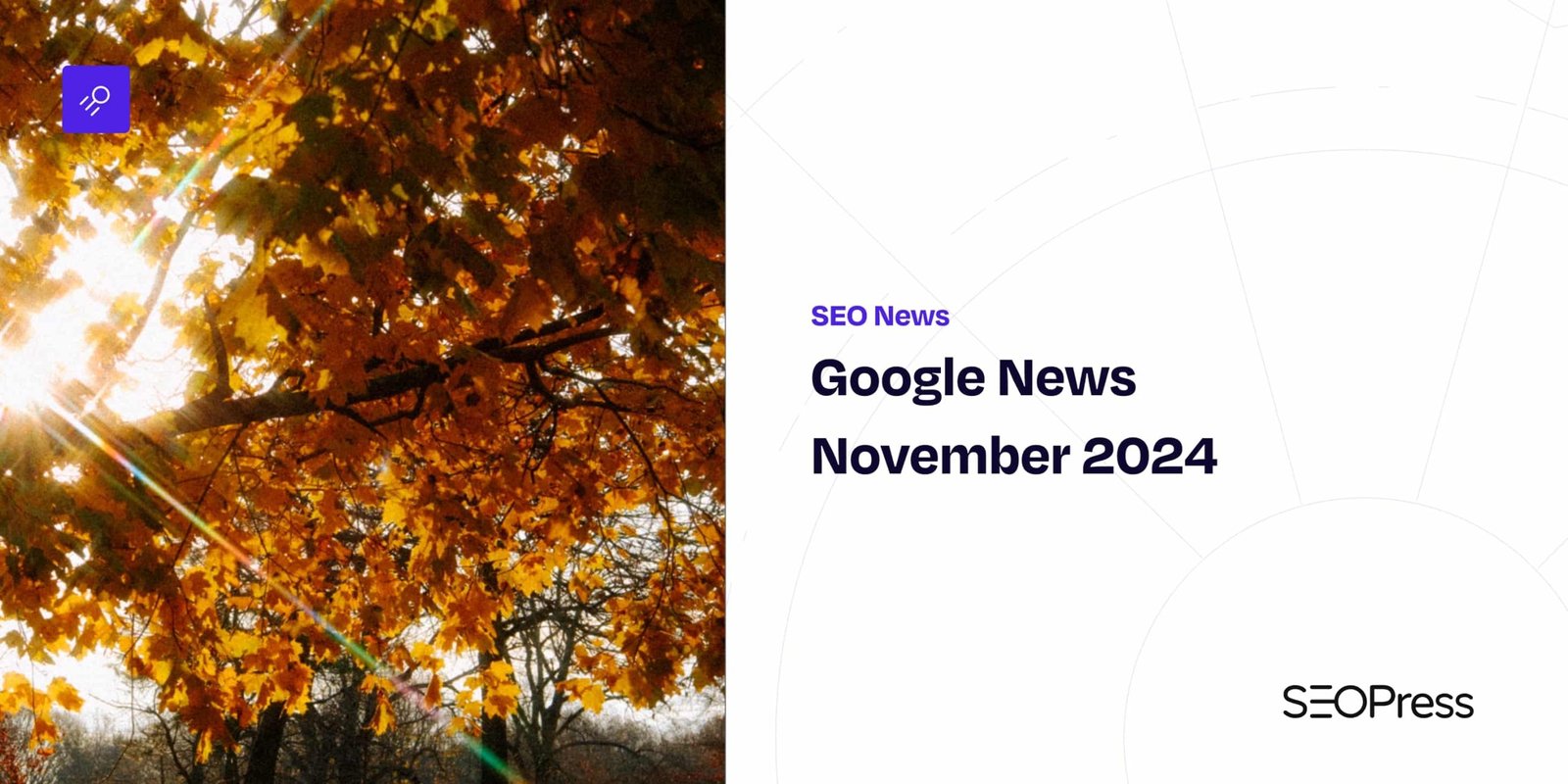It’s not cool when a Google update happens when you are on holiday. After an August Core Update hitting European vacations, the November 2024 Core Update hit the US during Thanksgiving. It started in time to be finished by November 26th but by the end of the month it appeared to be still rolling out! The update held the menace of taking traffic and revenues from a lot of websites leading up to Black Friday and should now have site owners worried about this happening in the build up to Christmas. The Core Update wasn’t the only change to Google in November, there were also manual actions and some big changes to Google results in Europe.

November 11th – November 2024 Core Update
A new Core Update was released on November 11th and at the time of writing we assume that it is still rolling out. Core Updates are major changes to Google ranking algorithms that are aimed at improving the quality of search results. A Core Update is non-specific (Google does release updates referring to specific ranking systems too) and they usually have a big impact on organic search results. Google has also indicated that changes implemented in Core Updates also impact AI Overviews and they probably impact local search results too.
The update was announced on X and LinkedIn by the Google Search Central account and on BlueSky by Google Search Liaison. It is interesting to note that the most detailed post was on LinkedIn, this reads in full:
Today we released the November 2024 core update to Google Search.
This update is designed to continue our work to improve the quality of our search results by showing more content that people find genuinely useful and less content that feels like it was made just to perform well on Search.
This has been added to our Search status dashboard at https://status.search.google.com/incidents/G7rp11wqTaTGn6JjiPF3 and will be updated when the rollout is complete. For more information about core updates, please see https://developers.google.com/search/updates/core-updates
The rollout may take up to 2 weeks to complete.
Rather than taking 2 weeks, the update seems to be taking longer. The Search status dashboard has not yet been modified to indicate that the update has ended. The update has also been notable so far for causing very little volatility in search results according to rank tracking software – as illustrated by the cognitiveSEO chart above. It may be that the rollout was suspended over the Thanksgiving holiday period in the US (including Black Friday and Cyber Monday) and will finish with a bang. It would have been nice to tell SEOs this though as many were worried about rankings when they should have been chilling out.
The document cited in all the social media posts, Google Search’s core updates and your website, advises site owners to check if their traffic has dropped during a Core Update. While this remains good advice, it is worth noting that traffic may be very volatile during a holiday period and not a good indicator. We recommend using software like SEOPress Insights to check ranking for your more important keywords. Updated daily and visible in the WordPress Admin, SEOPress Insights reports will give you a better understanding of any impact a Google update has had on your ranking.

Update to Site Reputation Abuse spam policy
On November 19th Google published a blog post Updating our Site Reputation Abuse Policy to explain a decision made to change their definition of site reputation spam (also called Parasite spam). This change was followed by a number of well-known sites receiving manual actions from Google causing pages to be de-indexed. This created massive visibility and traffic loss for sites such as Forbes, The Wall Street Journal, Time and CNN.
Writing on X, SEO expert Lily Ray said it was “Pretty wild how Google waited until days before Black Friday” to make this announcement and deal out manual actions. Many of the ecommerce sites affected were heading into Black Friday, their biggest time of the year.
On SEO Roundtable, Barry Schwartz wrote an article detailing the exact changes Google made to the spam policy guidelines and on BlueSky he shared a screenshot of a manual action received by a website.

Google back to 10 blue links in Europe?
The French SEO magazine Abondance reported in November that Google Germany, Google Belgium and Google Estonia are testing hotel search results without Google Hotel Finder and associated rich results in favor of a classic 10-blue-links Google SERP. This is part of a test being performed by Google to comply with a request from Europe to provide data about the impact of enriched results for searches on subjects like hotels and flights have on fair competition.
The article reminds us that Google has already made 20 modifications to search results in Europe to comply to the Digital Markets Act (DMA) including enhanced visibility for comparison sites for product and local searches.
Google also announced on November 16th that they were testing other changes in search results to comply with European Copyright Directive (EUCD). In this case regulators and publishers have asked for additional data about the impact of news content in Search. Google says that “To meet this request, we will be running a small, time-limited test in which we don’t show results from EU-based news publishers in Google News, Search, and Discover. This test will affect 1% of users in Belgium, Croatia, Denmark, Greece, Italy, the Netherlands, Poland and Spain.” France was dropped from the test when the Paris Commercial Court threatened Google with a €900,000 per day fine if French results were impacted.
It is worth noting also that European Union countries do not have AI Overviews results in Google searches. Google have never explained why AI Overviews has been released in 100 countries but not in Europe. It is felt that this decision is related to another European law, the Artificial Intelligence Act (AI Act), which entered into force on August 1st 2024.
There are no suggestions from Google that it will go back to a straightforward 10 blue links in Europe, but it is worth noting that SERPs in Europe are becoming distinctly different from SERPs in the rest of the world.
If you own a restaurant, you should add your menu to Google Business Profile so that customers can consult it easily on your profile. Adding a text version of the menu can also help potential clients find your restaurant when they search for dishes.
Reporting on Search Engine Land, Claudia Tomina from Reputation Arm spotted that it is now possible to upload a multi-page PDF file to Business Profile and Google will use AI to convert the menu into text. The feature only previously worked with single-page photos.

November Search News video
We are happy to see that John Mueller is back again with an episode of Google News. Released on November 13th, the news program does not talk about the November Core Update (does this mean that Google News is not recorded live John?) and it goes over a lot of news previously announced by Google.
In relation to his update on the new Recommendations section Google Search Console announced in August, it is worth noting that this new feature has now been released to all users. If you don’t see any recommendations on the home page of Google Search Console when you connect, it is because Google hasn’t any interesting recommendations for you yet. Sorry!
John has also introduced an interesting section highlighting resources published by the SEO community. This month sees him put the spotlight on an AI-generated SEO song by Alizée Baudez, a slide deck from Crystal Carter about SEO for brand recognition in LLMs and an article by Raquel Gonzalez on 8 international SEO mistakes and fixes.



